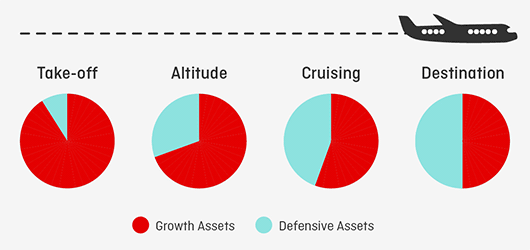How does Glidepath work?
Are you looking to put your super on autopilot? Well, that’s what Glidepath is for.
Glidepath is our automated investment strategy, designed to meet your needs today and into the future by adjusting your growth and risk profile over time. It works by investing your super based on your year of birth, so your super is always invested according to where you are in your life and career.
When you’re younger, and further away from retirement, Glidepath will expose you to more higher risk, growth assets and less lower risk, defensive assets. When you’re older, Glidepath will expose you to more defensive assets and less growth assets – this is because you have less time to weather a downturn in the market.

What's the difference between each investment stage?
Glidepath has four investment stages: Take-Off, Altitude, Cruising and Destination. You can learn more about these stages here.
When considering whether Glidepath is appropriate for you, you should consider which investment stage in Glidepath you would be invested in based on your age group and the relevant time horizon of that stage.
Glidepath doesn’t take into consideration personal needs and circumstances, but has been developed based on our assessment of the investment needs of a typical Qantas Super accumulation member aiming to provide a comfortable1 level of income in retirement.
1The Association of Superannuation Funds of Australia Ltd (ASFA) Retirement Standard benchmarks the annual budget needed by Australians to fund either a comfortable or modest standard of living in the post-work years. Learn more at www.superannuation.asn.au.
How do I know which Glidepath investment stage I'm invested in?
You and all members in your age group are invested in the investment stage which has been determined by Qantas Super as shown in the table below.
| Your year of birth | Investment stage your age group invests in |
|---|---|
| 2005-2009, 2000-2004, 1995-1999, 1990-1994, 1985-1989, 1980-1984 | Take-Off |
| 1970-1974, 1975-1979 | Altitude |
| 1960-1964, 1965-1969 | Cruising |
| Pre-1954, 1955-1959 | Destination |
When does my investment stage change?
Your account will automatically be invested in the next Glidepath investment stage as soon as practicable when Qantas Super determines that the average age of the members in your age group has reached the age listed below:
- Take-off: 45
- Altitude: 55
- Cruising: 65
- Destination: Not applicable
Qantas Super may defer transitioning an age group to the next investment stage if there is a major market event that creates extreme investment market volatility or potential illiquidity (for example, a significant banking failure or an economic depression).
We’ll let you know when your investment stage changes.
Example: Jack
Jack was born in 1990 and has chosen Glidepath as his investment option. Jack will join the 1990 – 1994 age group.
His account is automatically invested in the Take-Off investment stage in Glidepath.
He will stay invested in Take-Off until the average age of his age group reaches age 45.
At that point, Jack’s super will be automatically invested in the next investment stage, Altitude.
Important information
The information on this page forms part of the Qantas Super Gateway Member Guide Product Disclosure Statement (PDS) issued on 1 January 2024.
You should read the PDS and this document together with the Qantas Super Gateway Member Guide Supplement, the Investment Guide and the Voluntary Cover Insurance Guide.
In addition to the Investment Guide, this page is also relevant for members in Qantas Super’s divisions that are closed to new members – Divisions 1, 2, 3, 3A, 4, 5, 6, 7, 10, and 15.
Please read these documents carefully and keep them with your personal financial documents. We may update this page from time to time.

